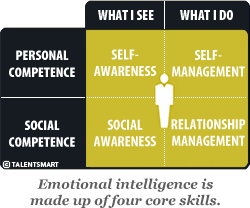Human being feels a large number of emotions every day. However, being emotional does not necessarily mean being emotionally intelligent.
What is Emotional Intelligence?
It is the quality to acknowledge and accept the emotions of self and others around us. The concept of EI was introduced by Daniel Goleman in 1990, in which he strongly emphasized regulating one’s own emotions for the personal and common good. One of the most reliable forums, The World Economic Forum in its survey, declared that Emotional Intelligence is one of the most sought-after skills in the present era. Employees with higher EQ can easily adapt to the fast-paced working environment and are making their way in almost every industry and every department.
Today, organizations are looking through the lens of EI in hiring, promoting, and developing their employees. The four components of EI, Self-awareness, Self-management, Social Awareness, and Relationship Management are so relevant today and can be combined with Human Resources for the enhancement of productivity and a harmonious work environment. Personal Competence focuses mainly on individual aspects and is more about staying aware of one’s own emotions and behaviours. Social Competence is about understanding other people’s moods, motives, and behaviors to improve the quality of relationships. A sound understanding of these concepts and their application help in achieving desired results, thus creating a happy work environment.

Why emotional intelligence is crucial now?
Fast-paced work cultures demand skills that are much more than technical. Since technology is taking over and many tasks are getting automated, employees need to showcase those skills that can never be replaced. Social skills such as EQ, persuasion, negotiation, mentoring are higher in demand now. Companies are looking for talents who are agile and can easily adapt to the need of the hour.
In the present scenario, where the entire economy is impacted by COVID-19, the significance of Emotional Intelligence is much more where employees need to manage their personal and professional lives simultaneously due to the new norm of work from home. While the IT sector employees were familiar with work from home setup, it is a new experience for other sectors employees. Resistance to change with the sudden shift of working is adding negative emotions such as anxiety, stress, fear, and hugely impacting the mental conditions of people. Therefore, in a situation like this, having control over emotions is important. Measures such as prioritizing work, maintaining discipline, sticking to a routine, would come in handy.
Google’s famous project Aristotle initiative states that high performing teams need three things:
1) Social Sensitivity
2) an environment where every person gets the chance to speak and express
themselves
3) psychological safety without the fear of negative consequences.
We see that managers who understand the emotions of their subordinates are more approachable, hence more popular
compared to those who are not sociable. Today employees are expected to be both individual contributors as well as team players. Only those employees can handle the group dynamics well who understand the emotions.
Emotional Intelligence matters more now because the workplace has changed. Today, work is being done in teams, not in isolation. Organizations have realized that recognizing emotions can lead to a healthier environment. People with higher EI are also more adaptable to change, which is a must in this fast-changed digital age.
Here are some tips from the experts to develop Emotional Intelligence:
• Practice empathy
• Take critique well
• Prioritize work
• Observing your reactions in tough situations and analyze them
• Be approachable and sociable
Seeing the importance of EI growing, we can see that the parameters for hiring Managers and Leaders have changed. For instance, there are five candidates A, B, C, D, and X for a Managerial position. B represents the ideal candidate as per the graph. Everybody wants them. C and D are less desirable. The real dilemma would be whether to hire A, who has the highest skill sets but low EI, or X, who is of slightly lower skill level than A but has high Emotional Intelligence. These days hiring managers are preferring candidate X over A.
Application of EI in Human Resources
The best way to hire good candidates is to make EI a part of the hiring process. Conducting interviews by asking thoughtful and open-ended questions would give the candidates the space to speak more, letting the interviewer judge their thought process and behavior. Creating a Job description that defines the personality traits of the desired candidates would help in screening. Other methods like Checking references, conducting group interviews, etc would give better results. Negative behaviors like avoiding the bosses, stress leading to emotional outbursts, lack of flexibility, conflicts, etc hold the organizations back. Coaching on Emotional Intelligence can cater to this need. It can improve communication skills, improve work relationships, improve decision-making, reduce stress, and increase motivation among employees.
Studies show that high-performing leaders have higher emotional intelligence. EI tools such as leadership assessments, feedback, quizzes, help in improving the performance of leaders, and also create Success profiles to select recruits.
Author: Deeksha Srivastava MBA-HR (SCMHRD)
Intern at Nevoxel




